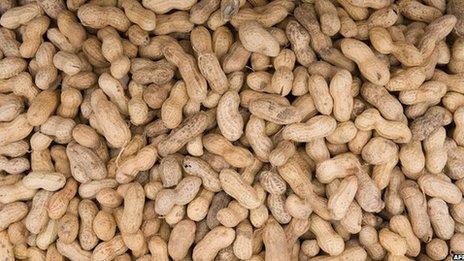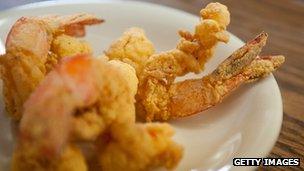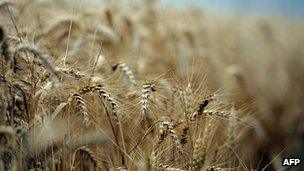Food allergy and intolerance self-diagnosis
- Published

Peanuts can cause those allergic to them to go in to shock
The number of people who believe they have a food allergy or intolerance has risen dramatically in the past few years, experts say, with up to 20% of the population now believing they are affected in some way - but how many really have a medical condition?
Hairdresser Jane Delaney, who is 21, believes she is one of the thousands of people with a food intolerance.
"I'm trying to get a test at the moment to find out if I am lactose intolerant or something along those lines, because I have a problem with my diet… with diarrhoea or constipation.
"It's just mad, like takeaways, chicken and chips… you don't know what they're cooking things in, and whether they are putting things in they shouldn't be. It's just a nightmare.
"If I cook everything I make from scratch, so I know what's in it, that's a lot better." Avoiding processed food has helped reduce her symptoms, she says.
A food allergy is a serious, often life-threatening reaction to a particular food that involves the immune system. Food intolerance is less serious causing vaguer, more general symptoms.
The two are often confused, says Dr Robbie Foy, professor of primary health care at Leeds University.
"Allergy is meant to mean your autoimmune response being overactive, which is slightly different from areas like food intolerance, where some foods just don't suit people - and that causes some of this blurring of boundaries."
A large increase in the number of children admitted to hospital with severe allergic reactions (anaphylaxis) - a 700% rise between 1990 and 2004 - was highlighted inrecent guidance, externalfrom the National Institute for Clinical Health and Excellence (NICE).
But evidence for the growth in food intolerance is a lot less clear.
Experts believe too many people are self-diagnosing and altering their diets to leave out important food groups in the belief they are sufferers without real evidence or informed help.

Kristian Bravin says sometimes allergies to foods like prawns develop in later life
"We get people coming to the clinic with severely restricted diets," says Kristian Bravin, senior dietitian at University Hospital in Leicester. "We have to be careful they don't avoid more and more food." That can lead to a diet deficient in key vitamins or minerals.
He says while 20% of the population believe they have a problem "the reality is much smaller than that". He says the numbers actually suffering from a food allergy are probably closer to between 1-2% of adults, and 4-6% of children.
While a nut allergy, for instance, is relatively easy to define with a blood test. Food intolerance is far more difficult to diagnose.
And GPs are not trained to spot food allergies or intolerances. There is probably a lot of under- and overdiagnosis going on, believes Dr Foy.
Sales of gluten free, dairy free and many other kinds of specialist dietary products, many of them highly processed, have almost doubled over the past five years.
Last year £238m was spent in the UK on "free-from" food including ready meals, bakery goods, snacks and meat products.
Much of this increase reflects a "lifestyle option for many people", says Laura Kempster, analyst at Leatherhead Food Research.
"There's a wider band of consumers that really believe that free-from foods offer a healthier lifestyle - that cutting wheat or dairy out of their diet may simply be better for them," she says.
And she says retailers are also stimulating awareness and interest as they introduce products and make them available to mainstream consumers.
During the BBC's recent broadcast of the six-hour Australian Open semi-final between Andy Murray and Novak Djokovic, commentators noted how Djokovic and Murray were now on gluten-free diets, which they linked to their performance and endurance.
It was golden news to food marketers looking to grow the "free-from" foods market.
But it has been reported Djokovic had undiagnosed Coeliac's Disease, an auto-immune reaction that damages the lining of the small intestine, triggered by gluten found in wheat, barley and rye.
For sufferers, avoiding gluten is a challenge as it is used in hundreds of thousands of processed foods, from soups to self-basting poultry.
And there is more gluten in our modern diet - in particular the modern loaf. Bread used to be a fermented product, which allowed the breakdown of proteins such as gluten.
But it is now almost entirely industrialised using additives, so most supermarket loaves contain much more pure gluten.
"People in the UK are eating a much higher level of wheat-based products," says Kristian Bravin. "People are often eating wheat-based foods (such as bread or pasta) three times a day."
Our diets have changed more since the 50s than they have in the last 2,000 years and even more so in the last three decades.
And this, says Bravin, is the background to many of the theories about the rise in food allergies.
There has been a massive decrease in Vitamin D in our diets from fish, eggs, and grass-fed animal products, which has already been linked to some cancers and cardiovascular problems.
We have also switched from eating butter and other saturated fats to consuming lots of vegetable oils in margarines and processed foods - a development some scientists believe is also involved in stimulating the immune system in a way that can cause damage.
On top of that we are eating less fresh fruit and vegetables and some scientists link a lack during childhood to the inadequate development of a normal immune system.

Gluten found in wheat can provoke a severe allergic reaction
"One of the theories is down to the pollution and the environment and things we're exposed to in the air stimulating your immune system," says Bravin
"Another theory why we are having more allergies now is that we're too clean, too sterile - we don't allow the immune system to develop in way it should do."
The experts believe as new foods are developed and adopted new allergens will develop.
But for now they hope people will stop self-diagnosing and seek professional advice before altering their diets substantially.
The modern diet, it seems, is not very good for us. Or as the great American food writer Michael Pollan wrote recently, the answer to a lot of what ails us could be avoided by a simple rule - of not eating what he calls "foodlike substances".
"Eat food. Not too much. Mostly plants."
The Food Programmeis broadcast on Radio 4, Sundays at 12.30 GMT, repeated Mondays at 15.30 GMT. Hear Sheila Dillon'sreport on food allergieson Sunday 18 or Monday 19 March or listen online at the above links.
- Published11 March 2011
- Published10 August 2010